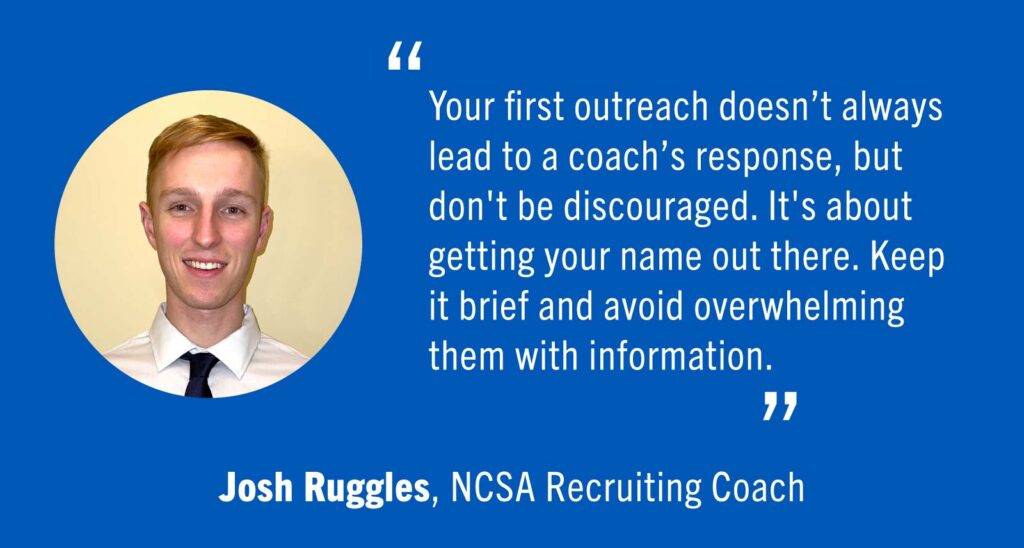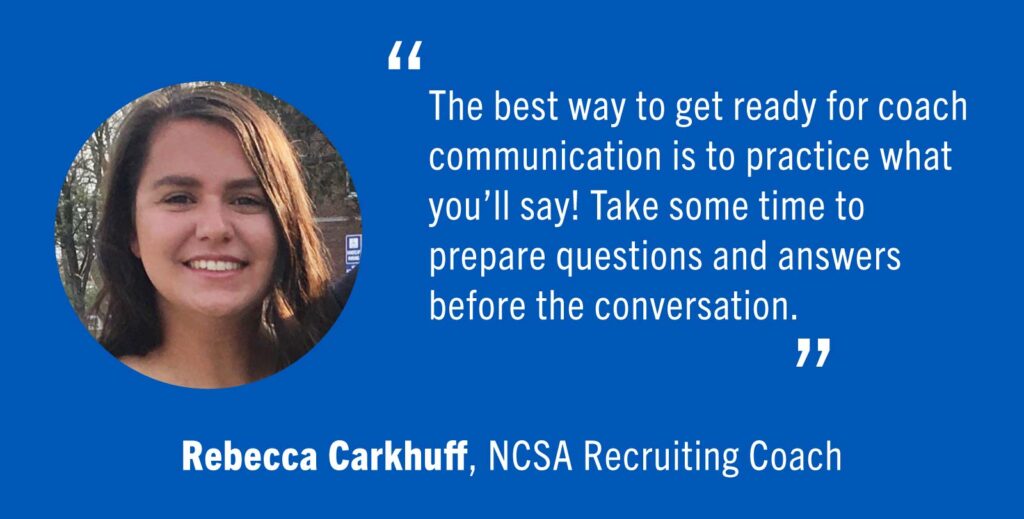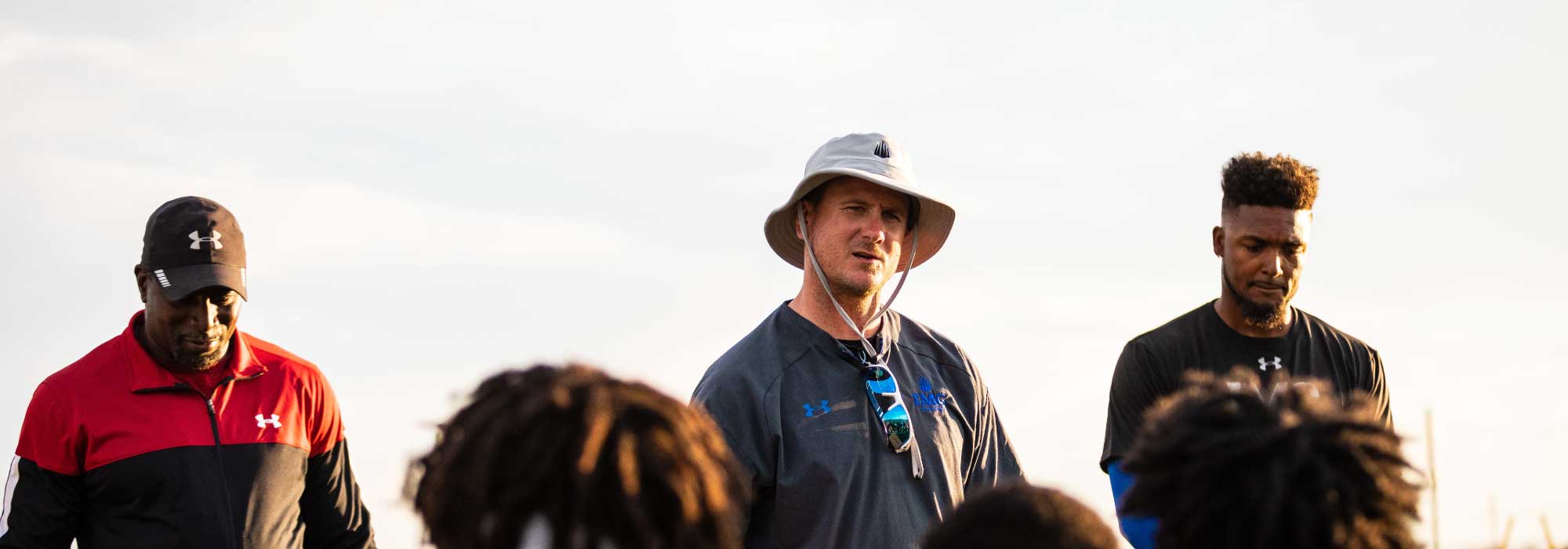Wondering how to contact college coaches? The best way is to proactively reach out using methods like email, text, phone calls or social media. We’ll cover when and how to do it effectively below.
Table of Contents
Key steps to contacting college coaches
1. Send an introductory email to the coach
Email is the best way to introduce yourself to college coaches. You can include all of your important information in one message, making it easier for coaches to evaluate your potential as a recruit.
Read how to write an introductory email that will get a college coach’s attention.
2. Follow-up with a call to the coach
After you send an email, consider making a follow-up call to discuss your achievements and college goals in more detail. It’s a good idea to wait about one to three days before making the call to give the coach time to review your information.
Read how to call college coaches—as well as how to leave your best voicemail.
3. Respond to recruiting letters from college coaches
When a college coach reaches out to you, it’s important to reply promptly and professionally. While recruiting mainly happens online, coaches may also send various types of recruitment letters to athletes.
Learn about the different types of recruiting letters you may receive—and how to respond.
4. Keep in touch with coaches and update them with new stats
Coaches value recruits they can connect with on a personal level. Keep them updated on your progress – both athletically and academically. Share your wins, grades and any improvements made to your game.
Learn more about texting college coaches or direct messaging coaches through your social media platforms.

When can college coaches contact you?
For most sports at the NCAA D1 level, coaches can start contacting recruits starting either June 15 after their sophomore year of high school or September 1 of their junior year. Check the NCAA recruiting rules to find out the exact date for your sport. NCAA D2 coaches can contact recruits at any time.
The NCAA calendars can help you know when your sport is actively recruiting. Even if coaches can’t directly contact you, they can still check your emails, follow your social media and track your progress on your NCSA profile. It’s all part of the long game!
When should you start contacting college coaches?
While college coaches have specific rules about when (and how) they can reach out to student-athletes, you have some flexibility in starting the conversation. The timing for reaching out to college coaches depends on your own recruiting journey and goals.
Here’s a general timeline to help you know when to start contacting college coaches:
- Rising Freshmen: Team up with your parents, high school/club coach or guidance counselor to identify target schools and the right division level. Start filling out online questionnaires at these schools to express your interest in being recruited.
- Rising Sophomores: Now’s the time to gather information about the colleges you’re eyeing. Once you feel confident that your grades and skills make you a strong prospect for that school, you can send introductory emails. Don’t forget to update your NCSA profile first!
- Rising Juniors: This is a pivotal year for coach communication, especially for D1 as they can now contact you directly. Continue to send introductory emails to your top schools and start preparing for coach phone calls by having a list of questions and answers ready to go.
Need some help with your answers? We’ve got your back. Here are 8 questions asked by college coaches and how to answer them effectively.
- Rising Seniors: At this stage, you should have already established connections with your target schools. Focus on nurturing these relationships through phone calls, texting, and social media as you receive offers and make your final decision.
Insider Tip: Sometimes, college coaches start recruiting as early as 8th grade – especially at the D1 level. If colleges are already interested in you at this stage, you’ll want to send your introductory emails right away. Your high school or club coach can assist you in these early conversations by calling college coaches on your behalf until the NCAA allows direct contact.
Watch the video below to see how the NCSA app helped the Alvarez family stay organized in communicating with college coaches during their recruiting process:
How to find coach contact information
Nearly all college coaches have their email or phone number listed on their school’s website. To find it, click on the coach’s bio under the roster tab. If it’s not there, look in the staff directory for the athletic department.
Looking up college coach info on your own isn’t hard, but it can be time-consuming. Why not simplify it? NCSA provides contact details for college coaches nationwide, making communication prep easier.
Want to learn how? Watch the video below!
What to say to a coach when you want to be recruited
Coaches receive a ton of emails from interested recruits, so if you want to get recruited, you’ll need to stand out. Here’s what you should say in your message:
- Address the coach: Be sure to include “Coach” before a coach’s name in the greeting. Instead of just saying “Hi, Mike,” address them as “Coach Mike.”
- Introduce yourself: Who are you? Where are you from? What do you want?
- Express why you’re interested in the program: Find something that stands out to you about the school or team (prove you did your research!)
- Provide key athletic and academic info: Coaches need to know this information upfront for eligibility purposes and to see whether you fit their recruiting needs.

Communicating with college coaches about camps
Before you head to a college camp or a recruiting event, it’s a great idea to reach out to the coach. Not only does this express your interest in being recruited by them, but it also helps coaches plan their recruiting schedule more effectively. This ensures you’re on their radar for evaluation.
Afterwards, follow up with the coach by email, phone or text. If they were there, send a thank-you message, and ask for their thoughts on how you did. If they couldn’t make it, just give them a quick update on your performance or share your experience at the event. This not only keeps them in the loop but also helps build a solid relationship between you and the coach.
How to tell a coach you are interested
There are many ways to let a college coach know you’re interested in their program. The most obvious answer is to send an introductory email, telling them that you want to be recruited and why you would like to join their program. That’s a good start, but what matters most to coaches is how often you communicate your interest.
Here are some ways to show a coach you are interested:
- Fill out online questionnaires: Completing these forms shows your commitment to being recruited.
- Give them a call: If you already have a connection with the coach, don’t hesitate to pick up the phone and keep the conversation going. Just make sure you have a purpose and some questions prepared.
- Send a text: Keep your name on their radar with a thoughtful text message. Make sure it’s sent at an appropriate time and has a genuine reason, like congratulating them on a recent game.
- Stay active on social media: Follow the coach and their team on platforms like X (Twitter) and Instagram. Engage with their posts by liking, sharing and commenting on anything related to their program.
- Show face: Try to attend camps, showcases or nearby games if possible. Face-to-face interactions can leave a strong impression on coaches, and it’s hard to deny someone’s interest when they show up!
Insider Tip: Did you know that by working on your mental performance, you can improve your coach communication? Get personalized coaching with IMG Academy+ to help boost your confidence and develop the skills you need to excel in sports and communicate effectively with college coaches. Learn how you can take advantage of IMG Academy+ Coaching, now included with an NCSA MVP Membership.
How to let coaches know you’re NOT interested
Never ghost a college coach! Telling a coach that you’re not interested in their program can be uncomfortable, but it’s important you do. Whether you’ve decided to go to another school, your interest has faded, or the program wasn’t your cup of tea from the start, it’s always good practice to communicate your decision. Why? Coaches have extensive networks, and how you handle this situation can reflect positively or negatively on your character.
Here’s how to tell a coach you are not interested, politely:
- Be straightforward and honest
- Express appreciation for their offer or interest
- Share a brief explanation of your decision
If you’ve already established a relationship with the coach, it’s best to give them a call. For initial coach contacts, sending an email is perfectly fine. Coaches will value your honesty and this approach shows maturity. Plus, it keeps the door open in case your circumstances change.
Parent Tips: Preparing for coach communication
Student-athletes are the ones who should lead the way when talking to college coaches, but parents can help get them ready for these critical conversations.
Here’s how parents can make sure their child is all set for coach communication:
- Identify priorities together: Sit down with your student-athlete and encourage them to list their most important factors when choosing a college, team and coach. What are their must-haves? Is it excellent academics, a specific division level or something else? Clarity here is key.
Explore the main differences between college division levels.
- Narrow down their college list: After discussing their preferences, work together to narrow down the list of potential colleges. Focus on schools that align with their athletic, academic, financial and social needs. Then, create a shortlist of realistic schools for them to reach out to.
Create a target list of schools on your NCSA profile. Don’t have one? Create yours today!
- Thoroughly research schools and teams: Take the time to research the schools and sports programs on your athlete’s list. Learn about the school’s academic offerings, the team’s history and the coaching staff. The more you know, the better prepared they’ll be for those coach conversations.
Find out how social media can give you an inside look into sports programs.
- Prepare questions and encourage notetaking: Help your student-athlete come up with a list of questions to ask coaches. Decide who will take notes during these conversations, as they’ll be helpful for remembering what was discussed and for comparing schools later on.
See some questions you should be asking college coaches.
- Build their communication skills: Coaches value strong communication skills! Have your athlete draft an email and review it together or try simulating a coach phone call to get them comfortable answering questions and discussing their goals. Eventually, they’ll need to do this on their own. Practicing these types of interactions will boost their confidence and get them ready for important talks with college coaches.
Here’s what to expect during a coach phone call.
Learn More At An expert-led workshop
Check out the ones below or click here for a full list.
Frequently Asked Questions
Can high school athletes contact college coaches?
Yes, high school athletes can contact college coaches at any time. The NCAA rules only limit when college coaches can reach out to recruits. Unless you’re one of the top athletes in the country, you’ll need to proactively reach out to coaches to get recruited. Even if they can’t reply immediately, they can still read your messages and follow your recruiting progress.
Should you email the head coach or assistant coach?
For D1 programs, start by contacting the recruiting coordinator, as they typically handle all recruiting matters. If there’s no recruiting coordinator, consider reaching out to a coach who specializes in your position or the associate head coach before contacting the head coach.
For all other divisions, it’s generally best to reach out directly to the head coach, unless the program specifies a different point of contact like a recruiting coordinator.
How long do college coaches take to respond?
After sending an introductory email to a college coach, recruits can expect a response within one to two weeks. If you receive a response within this timeframe, a coach is most likely interested in recruiting you. Coaches have busy schedules and depending on the time of year it may take longer to read your email.
What if a coach doesn’t respond after sending a follow-up email?
If you haven’t received a response from a coach after a follow-up email, check with your high school or club coach to see if they have any information. They can try to contact the coach on your behalf. Coaches can get swamped with emails, but sometimes, no response might signal a lack of interest. Be patient, explore other options and concentrate on schools that are actively showing interest in you.
When should you stop reaching out to a college coach?
Recruits should typically stop contacting a coach or program if they fail to meet the program’s academic or athletic requirements, if the coach makes it clear they’re no longer being considered or if the coach has already completed the roster for the recruit’s graduation class.
Help with contacting coaches
When it comes to contacting college coaches, the timing and how you do it really matter. Whether you’re sending emails, making phone calls, writing letters, texting or using social media, knowing when and how to reach out is a crucial part of your recruiting journey. It’s all about making a strong first impression and effectively showing your interest and skills!
At NCSA, we have a team of coaches and student-athletes who’ve been through this process themselves. We understand the nerves that come with that initial outreach, and we’re here to help you get ready. Take the next step. Create a free profile today!
